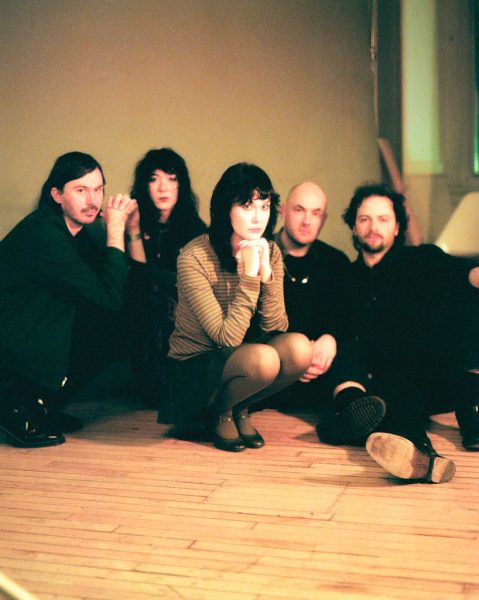Show Lineup
Wombo
(Louisville, Kentucky)
Wombo’s third album, Danger in Fives, isn’t a reintroduction; it’s a reminder. Throughout Danger in Fives, Wombo — the Louisville-bred three-piece of Sydney Chadwick (bass/vocals), Cameron Lowe (guitar), and Joel Taylor (drums) — not only enhance their formula, but routinely perfect it. The 11 tracks on Danger in Fives fine tune Wombo’s enchanting alchemy while firmly pushing the band into new territory. Maintaining the confidence of Wombo’s last full-length, 2022’s Fairy Rust, Danger in Fives reconnects with the intuition that led their wild experiments on the 2020 debut LP Blossomlooksdownuponus. Wombo’s gauzy take on post-punk — characterized by a looming darkness which Chadwick jokes is “inevitable” in their music — floats between unexpected riffs and lived-in melodies.
To perfect the formula, Wombo first had to tear it apart. Standard practices of writing and workshopping material in their post-war basement rehearsal space were paused, as the band explored alternative writing processes. Even demos that took shape quickly — Danger in Fives standouts “S.T. Tilted” and “Cloud 36,” plus its opening title track — were carefully analyzed and adjusted. “We really quickly threw a lot of paint down and it was almost the picture, but we still tweaked it for a year,” Lowe says.The time spent refining ideas allowed Wombo to process and workshop as they lived and toured. Danger in Fives marks the first time the band experimented with writing while on the road, with album standout “A Dog Says” assuming its final form in a hotel room.
The band’s desire to change their model was in part to “get away from a results mindset, where it’s about producing things for a certain expectation instead of doing it all for the joy of exploring,” Lowe says. This commitment toward artistic exploration led Lowe to capture as many ideas as possible, resulting in over 30 demos he then brought to Chadwick to help pare down. “There were a lot of ones where I was like, ‘This sounds really cool but it doesn’t sound like a Wombo song,’” Chadwick recalls. From those ideas, the two fleshed out basic sketches before bringing demos to Taylor in the basement. Album centerpiece “Neon Bog” emerges from this batch, a free-flowing mosaic of fortunate mistakes driven by the band’s intuition and anchored by the recurring strike of a cowbell. Soaring, distorted vocals — a result of recording Chadwick’s take to a guitar amp simulator in error — are collaged with haunting echoes, embracing a studio mistake to end with something uniquely Wombo.
The experimentation across Danger in Five’s writing process comes paired with subtle shifts in Wombo’s palette: the welcome addition of digital texture, and drum machine incorporated on a handful of tracks. “I definitely had to come to terms with it, but it’s for the sake of the song,” Taylor says of the digital additions, continuing, “It’s hard to get noises like that in the studio.” Taylor wasn’t alone in departing instrumentally to achieve Wombo’s collective vision for Danger in Fives. Standout single “Neon Bog” marks the only Wombo song to not feature Chadwick on her cherished Dan Electro bass, instead featuring Lowe on a heavier Peavey Foundation (offering what Chadwick calls a “fresh, janky quality”). “We tried it on the Dan Electro,” Chadwick clarifies, “but our quick decision ended up being the one that worked best.” These recording departures have allowed Wombo to tap into a newfound duality in their music. “I think it’s a treat when I go see bands and the live version is different from the album version,” Taylor says. “You get a new gift.”
Wombo first connected in Louisville in 2016 and have crafted a unique lane over the near-decade since forming, contorting post-punk structures into uncanny shapes. On Danger in Fives they twist another knot into their belt, and come out creatively renewed. This pursuit of strengthening their craft has earned Wombo a beloved reputation among their community of independent musicians. Ask any adjacent musician operating today who they’re listening to, and more often than not you’ll hear Wombo toward the top of the list. Throughout Danger in Fives, it’s clear what has made Wombo one of the most respected bands in their class, and it’s thrilling to hear them command new terrain. “I don’t want to be in a band that’s confined to one form of writing,” Chadwick maintains. “Where’s the fun and the creativity and the exploration in that? You have to push yourself and try something new.”
With Danger in Fives underway, it’s never been more unclear what the next new thing might be, or how Wombo may discover that. It’s also never been more exciting.
Smut
(Cincinnati, OH)
Smut is the project of lyricist Tay Roebuck, guitarists Andie Min and Sam Ruschman, drummer Aidan O’Connor, and bassist John Steiner. Roebuck, Ruschman and Min started the band a decade ago in Cincinnati, Ohio. Since then, they’ve played alongside Bully, Wavves, and Nothing. After years in the Cincinnati DIY scene, they made their Bayonet Records full-length debut, How the Light Felt. The record was a revelation. Pitchfork called it “a rigorous, decade-spanning study,” and a “well-oiled spin on late-’80s guitar pop.” Under the Radar called it “pop perfection,” that “blends subtle hooks with wistful lyrics.” It was a record that explored grief through the lens of melancholic dream pop, using drum machines and layered, intricate melodies.
How the Light Felt brought the band to Chicago, a city with more room for their growing sound. They still faced the modern struggles of the working musician, though: instability, objectification, financial precarity. The band channeled this period of touring, personnel changes, and personal upheavals into their latest offering,Tomorrow Comes Crashing.
Tomorrow Comes Crashing, Smut’s first record with O’Connor and Steiner, sees the band re-energized and trained on the limitless potential that comes with making music with people you love. Galvanized with a new lineup, Smut focused on creating a record that possessed the same towering intensity as the records that first got them into music: Three Cheers for Sweet Revenge, Relationship of Command. The outcome is ten of their most intense, bombastic, and focused songs to date.
Catharsis bursts through the seams throughout Tomorrow Comes Crashing. “Syd Sweeney,” inspired by the actress, is the record’s centerpiece. It’s about how profoundly strange it can be to be a woman, to be misunderstood by people who don’t even know you. The song is driven by chugging guitars and big, rolling drums. In other words: stadium rock about perception. Paramore meets Dookie. “She connects to the youth and the girls in the water/All she amounts to is someone’s daughter,” sings Roebuck in one particularly poetic moment. The song comes to a thrashing metal-inspired breakdown. It’s ecstatic.
It is a record interested in capturing those big emotions that come with falling in love with music for the very first time. Lead single “Dead Air” begins with crystalline guitars, fall-air crisp bass. Then Roebuck’s vocals come in. Her voice enters honeyed and dreamy, ala Harriet Wheeler, then turns into a wide-eyed scream. Lyrically, the song describes a break-up: “I heard you say forever,” Roebuck sings, sending a final ‘forever’ into the ether with a lilting melody.
To make the record, Smut recorded “as live as they could,” alongside Aron Kobayashi-Ritch (Momma) in a studio in Red Hook, Brooklyn, over the course of ten days. “We have so much energy right now,” says Roebuck. Right before they went off to New York, Roebuck and Min got married, with the rest of the band by their side.
The recording was a true labor of love — driving from Chicago with all their equipment, returning from 12 hour studio days to sleep on friends’ couches and floors, Roebuck completely blowing her voice by the end. Smut has always been DIY. Because they love it. Because they have to do it– there’s no other option.Tomorrow Comes Crashing is the culmination of that DIY spirit: making a record that completely encompasses the intensity, moodiness, and emotion of their journey so far.
Lunde
(Milwaukee, WI)
Three Wisconsin guys thrive on their differences. Cousins Nate Uhrich (lead vocals) and Jeremiah Lunde (drums) had long been passerby in each other’s lives. In 2018, the pair re-discovered their musical connection at a family gathering. Soon after, Josh Janiak (bass) joined and they decided to name the band “Lunde” (a family name).
Lunde’s first record ‘Living Strange’ highlights concise, engaging songwriting and Beach Boys-esque harmonies wrapped in a raw indie sound. 2025 brings the band’s newest record which they call, in tongue in cheek fashion, “Wisconsin’s First Band”. On this record, the band confronts some of the feelings that make us most human: happiness, anger, loneliness and everything in between.




